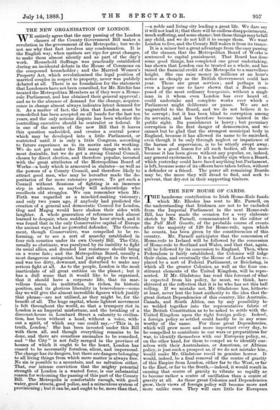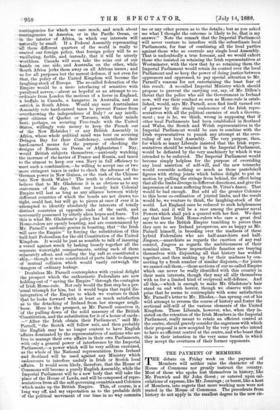THE NEW HOUSE OF CARDS.
handsome contribution to Irish Home-Rule funds. 11-19thich Mr. Rhodes has sent to Mr. Parnell, on the understanding that Irishmen are not to be excluded from the Imperial Parliament in the next Home-rule Bill, has been made the occasion for a very elaborate' sketch by Mr. Parnell, communicated to the editor of the Pall Mall Gazette, of the probable course of events. after the majority of 120 for Home-rule, upon which. he counts, has been given by the constituencies of this; country. Mr. Parnell anticipates that the concession of Home-rule to Ireland will be followed by the concession of Home-rule to Scotland and Wales, and that that, again, will be followed by its concession to England. Then, when Federalism is fairly established, the Colonies will lodge their claim, and eventually the House of Lords will be re- placed by a sort of Federal Parliament, or Reichstag, in which all the greater Colonies, as well as the four con- stituent elements of the United Kingdom, will be repre- sented. If Mr. Gladstone has read this forecast of what is expected from his policy, he must, we think, have shivered at the reflection that it is he who has set this ball rolling. If we mistake not, Mr. Gladstone has, hitherto- at least, never lent the least authority to the idea that the- great distant Dependencies of this country, like Australia,. Canada, and South Africa, can by any possibility be so welded together into the representative fabric of the British Constitution as to be asked to settle with the United Kingdom upon the right foreign policy. Indeed,. a foreign policy so settled could hardly be in any sense worthy of the name. For these great Dependencies, which will grow more and more important every day, to be compelled to contribute to our wars or preparations for war, to identify themselves with our European policy, or,. on the other hand, for them to compel us to identify our- selves with their Australasian, or American, or African policy, is just such a prospect as, if we do not mistake him,. would make Mr. Gladstone recoil in genuine horror. It would, indeed, be a final removal of the centre of gravity of this Empire from London, either far to the West, or far to the East, or far to the South,—indeed, it would result in causing that centre of gravity to vibrate so rapidly as to become rather a centre of oscillation than a centre of gravity at all. As these great Colonies and Dependencies grow, their views of foreign policy will become more and more imlike ours. They will care little for European. contingencies for which we care much, and much about • contingencies in America, or in the Pacific Ocean, or • in the interior of Africa, in which our interests will -naturally be small. If a Federal Assembly representing ' all these different quarters of the world is really to control our foreign policy, that foreign policy will be so vacillating, feeble, and unready, that it will be utterly • worthless. Canada will soon take the reins out of our • ;hands on one side, and Australia on the other, while 'South Africa jerks them away on all African issues ; and so for all purposes but the merest defence, if not even for that, the policy of the United Kingdom will become the laughing-stock of Europe. The so-called federation of the Empire would be a mere interlacing of sensitive with • paralysed nerves,—about as hopeful as an attempt to co- - ...ordinate from London the motions of a horse in England, • .tt buffalo in Canada, a kangaroo in Australia, and an • ostrich in South Africa. Would any sane Australasian !Assembly vote hard-earned taxes to prevent France from • overthrowing the independence of Italy ? or any intelli- -gent citizens of Quebec or Toronto, with their minds bent, perhaps, on securing Free-trade with the United States, willingly vote money to keep the French out of the New Hebrides ? or any British Assembly in Africa, whose whole political mind was bent on securing 'Delagoa Bay for their Confederacy, contribute their hard-earned means for the purpose of checking the .designs of Russia on Persia or Afghanistan ? Nay, would British subjects themselves,—anxiously watching • the increase of the navies of France and Russia, and taxed • to the utmost to keep our own Navy in full efficiency to -meet such a combination,—be willing to accept one or two more stringent taxes in order to cheek the advance of the Etorman power in New Guinea, or the rush of the Chinese • into New South Wales ? The truth is obvious, and we believe that to Mr. Gladstone it is as obvious as to any statesman of the day, that our loosely knit Colonial Empire will last as long as any alliance between widely different cotmtries of which the bonds are not drawn too ;tight, could last, but will go to pieces at once if ever it is -attempted to identify absolutely the interests of totally -distinct countries at opposite ends of the earth, and -necessarily possessed by utterly alien hopes and fears. Yet this is what Mr. Gladstone's policy has led us into,—that Home-rulers are openly boasting, and are countenanced by Mr. Parnell's sardonic genius in boasting, that "the Irish *will save the Empire" by forcing the substitution of this half-knit Federalism for the old Constitution of the United Kingdom. It would be just as sensible to talk of insuring a vessel against wreck by lashing loosely together all the -separate watertight compartments, setting each of them -separately afloat, and calling the big raft so constituted a ship,—though it were constituted of parts liable to dangers of mutual collision which would vastly outweigh the -.dangers of ordinary leakage.
Doubtless Mr. Parnell contemplates with cynical delight the prospect which the enthusiastic Federalists are now holding out of "saving the Empire" through the contagion 'of Irish Home-rule. Not only would the first step be a per- 'sonal triumph for him, but it would begin that rapid dis- integration of the Empire to which we venture to think that he looks forward with at least as much satisfaction as to the detaching of Ireland from her stronger neigh- !honr. Here is the prospect, as Mr. Parnell conceives it, ' of the pulling down of the solid masonry of the British 'Constitution, and the substitution for it of a house of cards : --" After the Irish obtain their Parliament," said Mr. Parnell, "the Scotch will 'follow suit, and then probably the English may be no longer content to have English 'affairs dominated by the representatives of nations who are free to manage their own affairs in their own Parliaments, with only a general power of interference by the Imperial Parliament, —a power which will be very seldom exercised, as the whole of the National representation from Ireland • and Scotland will be used against any Ministry which endeavours to interfere unduly in Irish or Scotch local affairs. It would seem likely, therefore, that the House of Commons will become a purely English Assembly, while the Imperial Parliament will be a new body that will take the place of the House of Lords, and will be composed of repre- sentatives from all the self-governing countries and Colonies which make up the British Empire. This, of course, is a long way off, and my expectation as to the probable drift • of the political movement of our time in no way commits me or any other person as to the details ; but as you asked me what I thought the outcome is likely to be, that is my answer." Note the remark that the Imperial Parliament will never venture to interfere with the subordinate local Parliaments, for fear of combining all the local parties against those who so overrule any single local Assembly. That is undoubtedly a true forecast, and we would exhort those who insisted on retsining the Irish representatives at Westminster, with the view that by so retaining them the Imperial Parliament would retain its control over the local Parliament and so keep the power of doing justice between oppressors and oppressed, to pay special attention to Mr. Parnell's reasons for not entertaining the least fear of this result. A so-called Imperial Ministry which should propose to prevent the carrying out, say, of Mr. Dillon's threat that the police who aid the Government in Ireland now, will rue their conduct so soon as Home-rule is estab- lished, would, says Mr. Parnell, soon find itself turned out of power b7 the steady coalescence of the Irish repre- sentatives with all' the political enemies of such a Govern- ment; nor is he, we think, wrong in supposing that if other local Parliaments had been established in Scotland and Wales, the Scotch and Welsh representatives in the Imperial Parliament would be sure to combine with the Irish representatives to punish any attempt at the over- ruling of any local Assembly. The very purpose, then, for which so many Liberals insisted that the Irish repre- sentatives should be retained in the Imperial Parliament, would be defeated by the very machinery by which it was intended to be enforced. The Imperial Parliament would become simply helpless for the purpose of overriding any local assertion of self-will, and the new tetrarchy would resemble nothing so much as those pastebbard figures with string joints which babies delight to put in motion by pulling the strings from behind, the effect being that all the limbs diverge in different directions, and give the impression of a man suffering from St. Vitus's dance. That would be bad enough. But add all the greater Colonies to this loose co-ordination of jointed limbs, and the result would be, we venture to think, the laughing-stock of the world. Let England once be reduced to such helplessness as that, and it will be a race among the greater naval Powers which shall pick a quarrel with her first. We dare say that those Irish Home-rulers who care a great deal more to see the British Empire tumbling to pieces than they care to see Ireland prosperous, are as happy as Mr. Parnell himself, in brooding over the madness of these hybrid Federalists who are half-anarchists and half- Jingoes,—anarchists as regards the exertion of any real control, Jingoes as regards the ambitiousness of their nominal aims. These impracticable fanatics are busying themselves with disjointing all that history has welded together, and then making up for their madness by con- necting by a fresh number of similar disjoints,—for joints we cannot call them,—those sections of our so-called Empire which can never be really identified with this country in their main interests, though they may all ally themselves with us for a limited kind of reciprocal self-defence. And all this,—which is enough to make Mr. Gladstone's hair stand on end with horror, though we observe with sur- prise that he seems to contemplate with some satisfaction Mr. Parnell's letter to Mr. Rhodes,—has sprung out of his wild attempt to reverse the course of history and foster the sectional self-will of the various elements of the United Kingdom. Those Liberals, however, who, when they in- sisted on the retention of the Irish Members in the Imperial Parliament, really meant to retain an efficient control at the centre, should gravely consider the eagerness with which their proposal is now accepted by the very men who intend to have no efficient control at the centre, and who boast that this is their intention in the very same breath in which they accept the overtures of their former opponents.



































 Previous page
Previous page